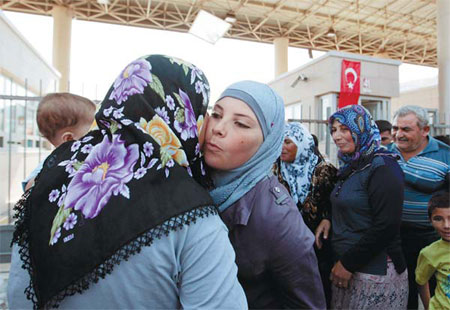Syria is ravaging its own heritage, UN says
|
Syrian refugees greet each other at the Cilvegozu border gate between Turkey and Syria on Friday, as the United States was preparing for a possible punitive strike against Syria's government. Gregorio Borgia / Associated Press |
The United Nation's cultural organization on Thursday urged Syria's government and rebels to spare multi-millennial heritage that is being ravaged by shelling, theft and illegal digs.
"I urge all parties to take the necessary measures to prevent further damage to this heritage, which is among the most precious in the Islamic world," UNESCO chief Irina Bokova said.
"The protection of heritage is not a political issue," she told reporters after a meeting of experts held in Paris and attended by UN special envoy for Syria Lakhdar Brahimi.
The meeting took place as Western powers were mulling military action against the Syrian President Bashar al-Assad over alleged chemical weapons use in deadly attacks last week.
More than two and a half years after Syria's crisis erupted, the UN body says it has a fairly clear picture of the extent of the damage inflicted to the country's many historical sites.
In June, it had listed Syria's World Heritage sites as being in danger, in a bid to "mobilize all possible support for the safeguarding of these properties which are recognized by the international community as being of outstanding universal value for humanity as a whole".
The sites are the ancient cities of Damascus, Aleppo, Bosra, the "dead cities" of northern Syria as well as the Crac des Chevaliers and Salah El-Din castles and Palmyra oasis.
Damascus and Aleppo are among the world's oldest continuously inhabited cities and the Crac des Chevaliers is considered the best-preserved Crusader castle.
Beyond the damage inflicted to Syria's historical sites by air raids, shelling and gunfire, the UN cultural body expressed concern over widespread theft of artifacts and rogue excavations.
"The trafficking is organized by powerful groups. We're talking about organized crime," UNESCO expert Francesco Bandarin said.
"You can already find stolen artifacts in Beirut. On some markets, there is a real influx," he said, adding that there had been recent precedents during the conflicts in Iraq, Libya and Mali.
Artifacts that have been dug up in illegal excavations are of particular concern because, unlike items displayed in museums, they have never been referenced.
"In such cases the damage is irreparable," he said.
According to a report submitted to UNESCO by Syria's antiquities chief Maamun Abdulkarim, dozens of sites have been affected, particularly in the regions of Aleppo, Idlib, Apamea, Deir Ezzor, Raqqa and Deraa.
Abdulkarim, a Syrian official whose department is part of the Syrian ministry of culture, said "the museums of Aleppo, Deir Ezzor, Hamas, Homs and Maaret al-Numan were targeted during the fighting".
Some of the main stolen artifacts he listed were an Aramaic gold-plated bronze statue dating to the 8th century BC, pottery from the Jaabar citadel in the central Raqqa region, daggers and other items from the Aleppo museum.
Agence France-Presse



















